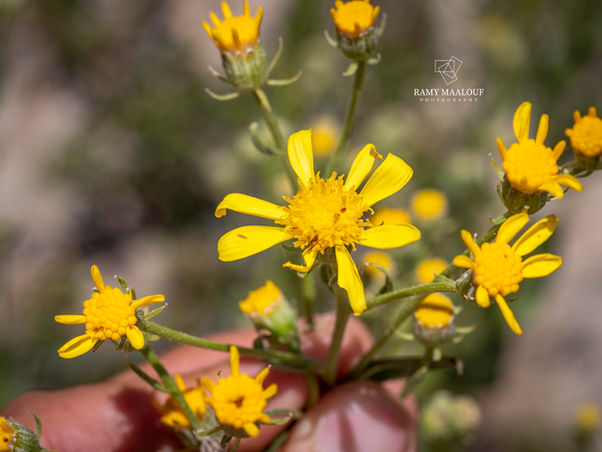Family |
Asteraceae
Senecio doriiformis
DC.
Leb. Syr. Tur.
Senecio doriiformis DC. subsp. doriiformis
(Prodromus Systematis Naturalis Regni Vegetabilis 6: 352, 1838; Nouvelle Flore du Liban et de la Syrie, vol. 3, p. 432; 1983)
• Life-form & habit: Perennial, glabrous, 50–100 cm or taller; multicaule with slender, erect, finely striate stems, simple or branched near the top.
• Leaves: Somewhat thick, ovate, more or less acute, slightly crenate-dentate or entire. Lower leaves ovate-oblong, shortly petiolate, obtuse, base truncate or shortly attenuate. Upper leaves ovate, somewhat acute, sessile, sometimes subcordate.
• Inflorescence & flowers: Peduncles shortly supported by setaceous bracteoles. Capitula ovate-hemispheric, c. 15 mm long. Involucre glabrous, with flat bracts, shortly linear-lanceolate, membranous at margin, somewhat acute. Involucel with a few subulate scales, half the length of the involucre. Ligules twice as long as the disk.
• Fruit: Achenes glabrous; pappus white, as long as the disk and twice as long as the involucre.
• Phenology: Flowers June–September.
• Habitat & elevation: Rocky slopes and cliffs in high mountain zones.
• Lebanese distribution: Mount Lebanon (Jabal Barouk, Jabal Kneissé, Sannine, Cedars, Hasroun, Dimane, ‘Ain Qa‘a above Ehden, Makmel, Foum-el-Mizhab); also reported from Jabal Hermon.
• Native range: Lebanon, Anti-Lebanon, Mount Hermon, extending to Iraq.









